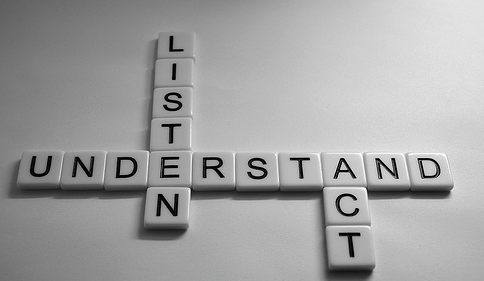In a world filled with noise, distractions, and differing viewpoints, effective communication has become more critical than ever. Stephen R. Covey, in his renowned book “The 7 Habits of Highly Effective People,” presents a profound principle: Seek first to understand, then to be understood. This principle encompasses the essence of empathetic communication, encouraging us to listen actively, empathize with others, and foster genuine connections. Today, we will explore the power of seeking understanding before seeking to be understood and how it can positively impact our personal and professional relationships.

The Art of Active Listening
The foundation of seeking to understand lies in the art of active listening. Instead of merely waiting for our turn to speak, true understanding requires us to give our undivided attention to the speaker. Active listening involves maintaining eye contact, providing verbal and nonverbal cues, and refraining from interrupting. By focusing on the speaker’s words, emotions, and body language, we can better grasp their perspective and demonstrate respect for their opinions and experiences.
Empathy: The Bridge to Connection
Empathy serves as the bridge that connects individuals on a deeper level. As we seek to understand others, empathy allows us to step into their shoes and experience the world through their eyes. It involves recognizing and validating their emotions, concerns, and aspirations. Through empathy, we cultivate a sense of compassion and build trust, fostering an environment where open and honest communication can thrive.
Overcoming Biases and Assumptions
Our biases and assumptions often hinder our ability to genuinely understand others. Preconceived notions based on stereotypes or past experiences can cloud our judgment and prevent us from empathizing effectively. To seek understanding, we must acknowledge and challenge our biases, remaining open to new perspectives. By consciously questioning our assumptions and seeking diverse viewpoints, we create space for growth, collaboration, and meaningful dialogue.
The Power of Dialogue
True understanding flourishes within the realm of dialogue. When engaging in conversation, we should aim to create an environment where everyone feels heard and valued. By fostering dialogue, we encourage the exchange of ideas, active participation, and collaborative problem-solving. Constructive dialogue enables us to uncover shared interests, explore different solutions, and ultimately reach a deeper level of understanding and mutual respect.
Building Strong Relationships
Seeking to understand before being understood is a cornerstone of building strong relationships. By prioritizing understanding, we demonstrate our commitment to the well-being and growth of others. It allows us to create a safe space where individuals feel comfortable sharing their thoughts, concerns, and aspirations. As we deepen our connections through empathy and active listening, we foster relationships based on trust, respect, and reciprocity.
Applying the Principle in Professional Settings
The principle of seeking understanding has immense relevance in professional settings. By employing empathetic communication, leaders can create a culture of collaboration, innovation, and employee satisfaction. Leaders who genuinely listen and understand their team members’ perspectives foster a sense of belonging, encourage diverse viewpoints, and motivate individuals to contribute their best. In the workplace, seeking understanding before being understood builds stronger teams and paves the way for enhanced problem-solving and decision-making.
Seeking Understanding in a Digital Age
In today’s digital age, where online interactions dominate, seeking understanding becomes even more crucial. Social media platforms, emails, and instant messaging lack the nuances of face-to-face communication, making it easier for misinterpretations to occur. By consciously practicing active listening, empathy, and open-mindedness in our digital interactions, we can bridge the gap and foster understanding, respect, and meaningful connections.
Conclusion
In a world where everyone seeks to be heard, the power of seeking to understand before being understood cannot be underestimated. Stephen R. Covey’s principle from “The 7 Habits of Highly Effective People” offers us a powerful framework for cultivating empathy, deepening connections, and building strong relationships. By mastering the art of active listening, embracing empathy, challenging our biases, and engaging in open dialogue, we unlock the potential for growth, collaboration, and harmony in both personal and professional spheres. Let us remember that true understanding begins when we choose to listen with our hearts and minds, and only then can we hope to be understood.


